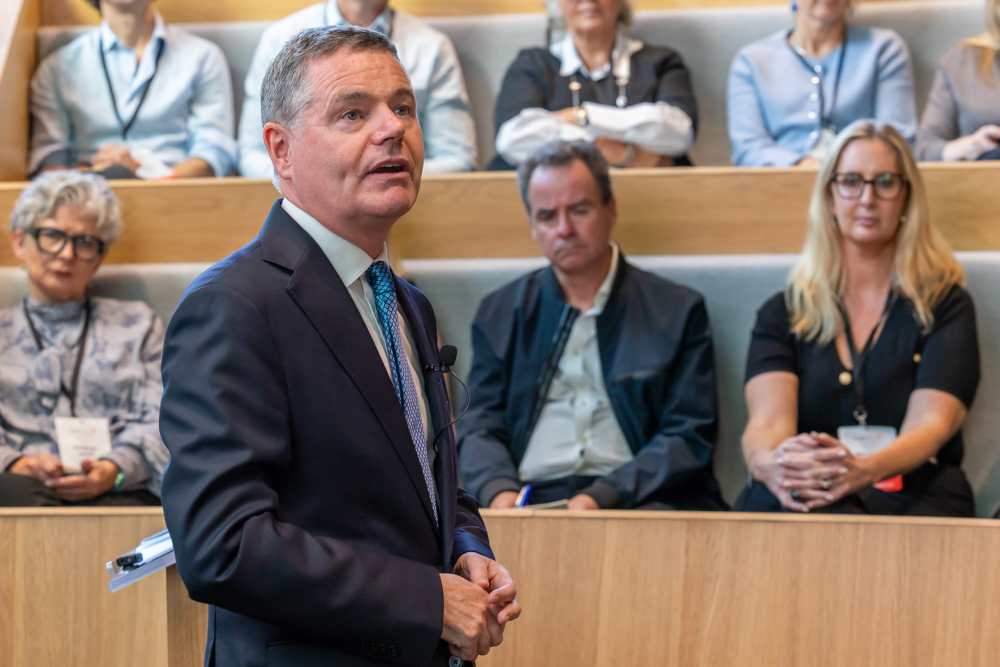Irish business groups react to Budget 2026: VAT cuts, R&D tax credit boost, CGT relief, AI funding and housing incentives spark mixed views across sectors.
Property and homebuilding
“The €1.3bn tax package is largely aimed at stimulating homebuilding,” surmised Bank of Ireland chief economist Conall Mac Coille. “The VAT rate on apartment construction will be cut from 13.5% to 9%. An enhanced corporate tax deduction on costs associated with apartment building is expected to cost €125m. The VAT rate on food, catering and hairdressing will also be cut to 9% from July 1st 2026. The rent tax credit is also being extended to 2028, costing €350m. An enhanced R&D tax credit, with a higher rate of 35%, will cost €350m. However, the carbon tax will rise to €7.50 per tonne of CO2 from €63.50 to €71.
Property advisor, Savills Ireland also welcomed the measures announced in Budget 2026 aimed at improving housing supply, particularly the reduction in VAT on the sale of new apartments from 13.5% to 9% until 2030 – something Savills first called for back in 2023 – and the introduction of corporation tax relief for cost-rental developments.
John Ring, director of Research at Savills Ireland, said the VAT cut represents a meaningful and well-targeted intervention that will help improve project viability and unlock stalled schemes.
“The reduction in VAT on apartment sales to 9% gives developers and funders the certainty needed to move projects forward,” he said.
“This is a welcome, practical measure that should help close the viability gap and stimulate much-needed apartment construction across our cities. We acknowledge that this was a complex decision, only made possible by changes to the VAT code at a European level in recent years that allowed for a reduction in the Vat rate for housing only on the grounds of “social policy”. The government have clearly satisfied themselves that reducing VAT for all apartment construction falls within this EU definition – but that cannot have been an easy conclusion to arrive at.”
However, Savills were critical that the limit of €500,000 for the Help-to-Buy (HTB) scheme was not increased, describing it as an important support for first-time buyers.
“When the €500,000 cap was introduced in 2017, it reflected the market conditions at that time,” he explained. “Because it hasn’t been adjusted for inflation, its real value has eroded – in today’s terms, that €500,000 is equivalent to roughly €400,000. If the cap had kept pace with CPI, it would now stand at around €630,000.
Indexing the cap to CPI would maintain its real value without being inflationary, unlike linking it to house price inflation, which would push the cap to close to €900,000.
R&D tax credit
The Irish Venture Capital and Private Equity Association (IVCA) welcomed Budget 2026 and says that the R&D tax credit proposals in particular will “boost Ireland’s competitiveness as a hub for cutting-edge research and innovation”.
The association also welcomed the increase in funding for Enterprise Ireland to help scaling companies, and the commitment to the development of an R&D Compass as well as the revisions to stamp duty for listed companies.
“By making it easier and more attractive for businesses of all sizes to invest in R&D, the Government is ensuring that Ireland remains at the forefront of global innovation and continues to attract world-class talent and ideas,” commented Caroline Gaynor, chairperson, IVCA.
“This focus on investment signals the Government’s continued commitment to fostering entrepreneurship, encouraging investment and backing scaling Irish companies,” added the IVCA chair. “It represents a powerful vote of confidence in the resilience and ambition of the Irish business community.”
Sarah-Jane Larkin, director general, IVCA said that the Budget is pro-business, pro-investment, and pro-innovation.
“The changes to the R&D tax credit in particular are forward-looking, encouraging more companies to take bold steps in research and development, while the measures to encourage private investment will help ensure that our economy continues to thrive in a rapidly evolving global marketplace.”
She added that the IVCA looked forward to working with stakeholders, industry, and government to maximise the opportunities arising from Budget 2026 and to ensure that these measures translate into long-lasting benefits for Ireland’s economy, workforce, and society.
Entrepreneurs lobby group Scale Ireland said it welcomed Budget 2026 and the focus on Irish entrepreneurs and supporting their innovative companies to create increased employment, exports and revenue. The independent not-for-profit representative organisation – which is the largest for the Irish tech sector – strongly welcomes the 5% rate increase in the R&D Tax Credit and an increase to €87,500 in the amount reimbursed in the first year under the scheme.
In particular, Scale Ireland welcomed:
- Increase in the rate of the R&D Tax Credit from 30% to 35%
- Increase in the year one reimbursement under the R&D Tax Credit scheme from €75,000 to €87,500
- Increase in the lifetime limit of the Revised Capital Gains Tax Entrepreneur Relief on gains to which the relief applies, from €1m to €1.5m to come into effect for disposals from January 2026
- Introduction of a stamp duty exemption for Irish companies with a market cap of less than €1 billion trading on regulated markets
- Increased allocation to Enterprise Ireland to support Irish businesses in scaling innovation, accessing global markets and creating high-quality
- Extension of the Key Employment Engagement Programme to 2028
The CEO of Scale Ireland, Martina Fitzgerald said: “This is a pro-innovation Budget with the 5% increase in the R&D tax credit rate providing a strong boost to indigenous tech companies at a time of great geo-political uncertainty and will incentivise increased R&D activity and spending in our sector. The increase in the year one reimbursement under the scheme will also greatly support early stage companies with limited cash flow to invest in their product and teams.”
The chair of Scale Ireland, Brian Caulfield, added: “The increase in the revised Entrepreneur Relief lifetime limit is very welcome and will go some way to encouraging entrepreneurship. We also welcome the Minister’s announcement that he will shortly publish a Research and Development Compass focusing on the areas of outsourcing and qualifying expenditure definitions. While the stamp duty relief for start-up and scaling companies on the stock exchange is also welcome, we look forward to the publication of the Savings and Investment roadmap and hope that it will be used as an opportunity to provide additional funds to the start-up and scaling se2ctor. We will be engaging further with the Minister and his Department on these measures.”
Scale Ireland said it also looks forward to hearing more about increased budget for Enterprise Ireland to help scaling companies. We also welcome the extension of the Key Employment Engagement Programme to 2028 but we believe it will need significant reform to make it fit for purpose.
Úna Ryan, Tax Partner at Grant Thornton Ireland, also welcomed the Revised Entrepreneur Relief in Budget 2026.
“An unexpected and welcome change announced by the Minister today relates to the lifetime limit for Capital Gains Tax (CGT) Entrepreneur Relief, which will increase to €1.5 million from 1 January 2026. This means that entrepreneurs disposing of qualifying business assets can now avail of a reduced CGT rate of 10% on gains up to €1.5 million.
“Previously, the relief applied to gains up to €1 million. This provides for a potential tax saving of €345,000 given the standard CGT rate of 33%.
“However, this may have an unintended consequence of delaying certain pending sales until early 2026.”
Entrepreneurs and employment
Kealan Lennon, CEO & Founder of CleverCards, Ireland’s fastest growing start-up according to Sifted, urged the Government to stop putting SMEs second place to FDI (foreign direct investment).
“There’s no doubt this is a budget shaped by caution prioritising competitiveness and infrastructure but it seems like small and medium businesses have been largely left out of the picture.
The last 12 months brought a lot of attention on the fragility of our FDI Corporation Tax receipts. What is not reported enough, is that while small and medium sized businesses are not big contributors to Corporation Tax (because they don’t make big profits), they actually contribute the same amount as the big guys in Employment Taxes and VAT – but they employ 70% of the country!
The biggest cost for most entrepreneurs in every town in Ireland is employment. Reducing that cost for business and putting economic firepower into the hands of those employees to spend with those same businesses drives economic growth.
Expanding Tax Free Benefit exemptions could have an immediate impact on cash flow and retention for small and medium businesses. We are still way below the range of Tax Free Benefits of all EU member states on this front. These aren’t expensive giveaways, they’re clever, targeted tools that support the backbone of the Irish economy.”
“We hear a lot about corporate tax receipts, but most small or medium businesses don’t benefit from those. They’re focused on survival, growth and keeping staff employed. When you strip out all the high-level fiscal language, small businesses are still the ones quietly paying the wages, collecting the VAT and keeping local economies moving, yet there’s little in the budget that directly recognises their role.”
“If we truly want to build a resilient economy, we have to stop viewing entrepreneurial-run businesses as a side note to FDI. Budget 2026 should have been the moment to put them at the centre not just in rhetoric, but in policy.”
Weathering Trump’s tariffs
“The Department of Finance published updated projections for the Irish economy today. GDP growth of 10.1% and 1% is expected in 2025 and 2026 respectively, before accelerating to 4% growth in 2027,” said Bank of Ireland chief economist Conall Mac Coille.
“This choppy pattern reflects the front-running of tariffs in 2025, export growth expected to slow to 1.5% in 2026. Consumer spending (2.3%), government spending (3%) and investment (1.7%) are all expected to contribute to domestic demand growth (2.3%) next year. The unemployment rate is expected to rise gradually from 4.6% in 2025, to 4.8% in 2026 and towards 5% subsequently.”
FDI
“The broadening of the participation exemption for foreign dividends will be broadly welcomed although as ever, the devil will be in the detail,” said Peter Vale, Tax Partner at Grant Thornton Ireland
“The increase in R&D tax credits from 30 – 35% is good news for both the FDI and indigenous sectors alike. It further enhances Ireland’s reputation as a knowledge economy. It also mitigates some of the adverse impacts of recent US tax changes aimed at disincentivising R&D carried out outside of the US. There is the promise of further reform in the Finance Bill.
“While the extension of the SARP (special assignee relief programme) will be welcomed, the increase in the minimum salary entry level is disappointing. More positively, the Finance Bill is expected to contain a simplification of the requirements to avail of the relief, which is much needed.
“The Minister included an interesting comment on the intention to modernise, digitalise and enhance the scope of our withholding taxes. We look forward to participating in the joint public consultation that is due to be launched in this regard.”
Personal taxation and the cost of living
“There were few changes to personal taxes in today’s Budget. Key income tax bands and credits were frozen, rather than indexed to inflation,” said Bank of Ireland chief economist Conall Mac Coille.
“Criticism that recent income tax cuts, focused on middle-income-earners, have narrowed the tax base seem have hit home. Cost-of-living supports (such as last year’s €250 energy price credit) were also eliminated. Together, these measures will provide a small drag on household incomes. That said, state pension and social welfare rates will rise by €10 per week.”
Nick Charalambous, managing director at Cork-based financial planning firm Alpha Wealth, commented: “It is a practical budget with no giveaways, which was expected, but it gives scope for future income tax changes. The Government clearly wanted to strike a balance between supporting those who need it most and maintaining discipline in public finances.”
Charalambous said there were limited personal taxation measures in Budget 2026. “The 2% USC band has been increased by €1,318 to €28,700, offering a modest benefit to lower earners. However, no changes were made to income tax bands or credits, signalling a clear shift from the broad reliefs seen in recent years.
The VAT rate for the food, catering, and hairdressing sectors will be reduced from 13.5% to 9% from July 2026, a move described as a lifeline for hospitality businesses still facing high operating costs.
“Hospitality businesses will welcome the VAT cut,” Charalambous noted. “It’s a sector that has faced real strain in recent years, and this should provide some relief alongside the increase in the minimum wage for workers.”
The Government also announced a reduction in the tax on investments in funds from 41% to 38%, marking it as one of the more significant measures in this year’s Budget. Charalambous said this represents “an improvement in the Budget for life assurance savings and investments.”
“The reduction in the exit tax rate is a move in the right direction and should encourage further investment,” he added. “However, the Government could have gone further, ideally aligning it with the 33% Capital Gains Tax rate to reward long-term savers better.”
“Unfortunately, there was no reference made to the eight-year deemed disposal rule or the 1% government levy. However, these may be addressed in the full report following the Budget.”
AI and e-commerce
“Digital Business Ireland (DBI) strongly support the commitment to provide €1.4 million in funding to establish the National AI Office as the central co-ordinating authority for the EU AI Act, and the promise from the Government to promote and leverage the use of AI in Irish companies, which is an area DBI has been campaigning for since the beginning of the year,” said DP Fitzgerald, spokesperson for Digital Business Ireland.
“DBI welcomes the Budget 2026 commitment to promoting and leveraging the productive use of AI in companies to ensure the benefits are optimised. This was a key DBI priority and we look forward to engaging with the Department of Enterprise on the details on this commitment.
DBI has campaigned on the importance for the government to lead the way in the use of AI, DBI is in strong support of commitments to increase AI use across a range of a number of Government departments, offices and agencies, including the Office of the Attorney General, Department of Defence, Tax Appeals Commission, and Office of the Director of Public Prosecutions.
“With the importance of digital compliance higher than ever before, DBI is very positive about the additional €3 million in expenditure allocation to the Data Protection Commission, which will be crucial allowance to help the DPC safeguard, guide and support businesses in regulatory compliance. DBI will be engaging with the DPC and Department of Justice to seek the allocation of some of this additional spending to enhancements of the DPC website and guidance for businesses,” Fitzgerald said.
Rural life
The Irish Postmasters’ Union (IPU) welcomed the €5 million in additional annual funding for post offices announced in today’s budget. Minister Chambers announced the additional funding “to strengthen the Post Office Network to enhance its role at the very heart of rural and community life”. This will bring total funding in the network to €15 million annually.
The organisation said this funding will help keep post offices open, protect services in towns and villages, and give postmasters the certainty they need to plan for the future. For communities it means continued access to trusted services on their doorstep, from everyday transactions to vital State services.
Sean Martin, President of the IPU, said: “This funding is a very welcome step forward for postmasters. It gives us stability after years of financial pressure and allows us to plan with greater certainty. I want to thank Minister Patrick O’Donovan and Minister Jack Chambers for their commitment and support, which sends a strong message that Government recognises the importance of the post office network.”
-
Bank of Ireland is welcoming new customers every day – funding investments, working capital and expansions across multiple sectors. To learn more, click here
-
For support in challenging times, click here
-
Listen to the ThinkBusiness Podcast for business insights and inspiration. All episodes are here. You can also listen to the Podcast on:
-
Spotify
-
SoundCloud
-
Apple




